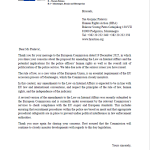16/05/2013 Coalition for monitoring the accession negotiation with the European Union – Chapter 23 presented its report today
16/05/201317/05/2013 Withdraw the Draft Law on Child and Social Protection for serious revision
17/05/201316/05/2013 Regarding the punishment of Vanja Ćalović for obstructing a police officer in the line of duty – with a kiss
The decision of the Local Misdemeanour Body in Podgorica to punish the Executive Director of MANS, Ms Vanja Ćalović, with 550 euros for allegedly obstructing a police officer in the line of duty – by kissing him, will become yet another example of absurdity and the violation of rule of law in Montenegro.
Vanja Ćalović received a draconian, for now non-final, punishment for the alleged obstruction of a police officer by kissing him. At the same time, some police officers and prison guards have been forgiven with final judgements for beating! For example, in one case, Ivezić was forgiven for multiple striking with open hand and fist on the head, multiple hand and leg striking on the head and body and causing a concussion! This and similar cases, as also the case of the betting of Vladana Kljajić in IECS, are described in the report of Human Rights Action on processing of ill-treatment and torture in Montenegro.[1]
Even when government officials of Montenegro are convicted for ill-treatment of citizens, they usually get inadequately mild punishment with a purpose of torture prevention – probation or mildest prison sentences, which are then mitigated or abolished upon an appeal or the President of the State[2] gives them amnesty. In the end, even though they have been legally convicted for ill-treatment, police officers are illegally kept as employees, as we recently confirmed on the basis of information we received from the Police Department and informed the Minister.
If the decision of the Local Misdemeanour Body in case of Vanja Ćalović’s kiss becomes final, Montenegro will become a state where it is definitely more convenient to beat someone than to kiss him/her, however, only if you are a government official! This is tragicomic and contrary to international standards, absolute prohibition of torture and ill-treatment, basic principles of the rule of law and common sense. Particular aspects of this case in regard to the violation of freedom of expression remains to be analysed.
We specially protest because the reform of misdemeanour bodies in Montenegro has not been applied till the middle of 2013, even though this was promised to the Council of Europe in 2004 during the submission of ratification instruments of the European Convention on Human Rights and Freedoms, together with Serbia, and again in 2006 when Montenegro was admitted to the Council of Europe as an independent state. The misdemeanour bodies in Montenegro do not fulfil the necessary requirements of independence from the authorities and they defy the European standard of the human right to a fair trial.
_______________________________
[1] Report available at: https://www.hraction.org/wp-content/uploads/Izvjestaj-Procesuiranje_mucenja_i_zlostavljanja-mart2013.pdf.
[2] Police officer D.D. was convicted because he helped unidentified persons – police officers of the Police Department – DU Podgorica to ill-treat the injured R.S., who was in these premises on the basis of a decision on detention, by taking R.S. to a room for detention, the so-called “betonjerka” (concrete cell) and then unlocked the door of the room for detention, as well as the door of the “betonjerka”. He turned off the lights and gave an opportunity to several unidentified persons to enter the room and hit him several times with their hands, feet and clubs in the head and body. Those hits that the injured person received caused light bodily injuries such as bruises and contusions on the body and fracture of a rib. The President of Montenegro gave amnesty to the offender D.D. on 10 July 2012, changing his prison sentence to parole.







 English
English